
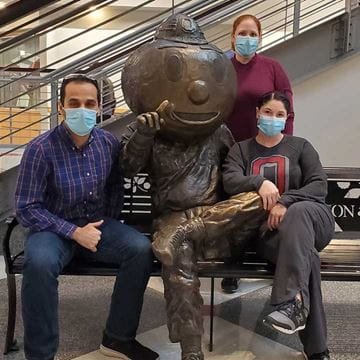 The Center for Serological Testing to Improve Outcomes from Pandemic COVID-19 (STOP COVID), supported by a five-year, $10 million grant from the National Cancer Institute in the National Institutes of Health, is bringing together an interdisciplinary team to examine the long-term effect of the pandemic on first responders, health care workers, and members of the general population.
The Center for Serological Testing to Improve Outcomes from Pandemic COVID-19 (STOP COVID), supported by a five-year, $10 million grant from the National Cancer Institute in the National Institutes of Health, is bringing together an interdisciplinary team to examine the long-term effect of the pandemic on first responders, health care workers, and members of the general population.
Pictured here are Osama Saadoon, Jennifer Frey, and Valerie Sircelj, all of whom are members of the STOP COVID team.
Co-Principal Investigators
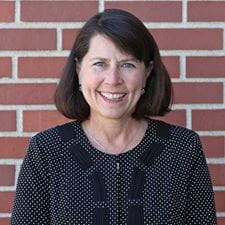 Dr. McAlearney is the Executive Director of CATALYST, Associate Dean for Health Services Research, and Distinguished Professor in the Department of Family and Community Medicine in Ohio State's College of Medicine. She also holds appointments as a professor of health services management and policy in the College of Public Health and professor of pediatrics in the College of Medicine at The Ohio State University. She has over 30 years of health services research experience and has been actively involved in both performing research and disseminating research results to academic and practitioner audiences.
Dr. McAlearney is the Executive Director of CATALYST, Associate Dean for Health Services Research, and Distinguished Professor in the Department of Family and Community Medicine in Ohio State's College of Medicine. She also holds appointments as a professor of health services management and policy in the College of Public Health and professor of pediatrics in the College of Medicine at The Ohio State University. She has over 30 years of health services research experience and has been actively involved in both performing research and disseminating research results to academic and practitioner audiences.
Dr. McAlearney enjoys collaborative research projects and engaging clinicians in health service research as well as mentoring junior faculty in their research endeavors. She has authored over 200 peer-reviewed publications, 10 books/edited books and 80 book chapters. Dr. McAlearney’s ongoing research focuses on information technology innovations in health care, population health management, quality improvement and organizational development, and she is an expert in both qualitative and mixed methods analyses. Dr. McAlearney received her undergraduate and graduate degrees from Stanford University and Harvard University’s T. H. Chan School of Public Health.
 Dr. Oltz is the Chair of the Department of Microbial Infection and Immunity and the Samuel Saslaw Professor of Infectious Diseases Department of Microbial Infection and Immunity. He received his degrees in chemistry from Cornell (BA) and Columbia (PhD) universities. His postdoctoral research in molecular immunology was performed at Harvard University with Professor Frederick Alt, a National Academy of Sciences member. Dr. Oltz was on the faculties of Vanderbilt and Washington universities before he moved to The Ohio State University. He has served the immunology community in numerous capacities, including as chair of an NIH study section, and he is editor-in-chief for The Journal of Immunology. His research focuses on genetic and epigenetic pathways controlling the development of human immune cells in both healthy and diseased states.
Dr. Oltz is the Chair of the Department of Microbial Infection and Immunity and the Samuel Saslaw Professor of Infectious Diseases Department of Microbial Infection and Immunity. He received his degrees in chemistry from Cornell (BA) and Columbia (PhD) universities. His postdoctoral research in molecular immunology was performed at Harvard University with Professor Frederick Alt, a National Academy of Sciences member. Dr. Oltz was on the faculties of Vanderbilt and Washington universities before he moved to The Ohio State University. He has served the immunology community in numerous capacities, including as chair of an NIH study section, and he is editor-in-chief for The Journal of Immunology. His research focuses on genetic and epigenetic pathways controlling the development of human immune cells in both healthy and diseased states.
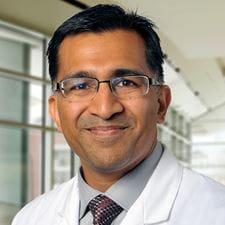 Dr. Panchal is an associate professor of emergency medicine with the Department of Emergency Medicine. He is passionate about improving patient outcomes in the prehospital setting and conducts research focused on prehospital airway management and improving outcomes from cardiac arrest. He began his career as a researcher completing a PhD in cardiovascular physiology at Case Western Reserve University. Following this, at The Ohio State University College of Medicine, he completed his medical training and residency.
Dr. Panchal is an associate professor of emergency medicine with the Department of Emergency Medicine. He is passionate about improving patient outcomes in the prehospital setting and conducts research focused on prehospital airway management and improving outcomes from cardiac arrest. He began his career as a researcher completing a PhD in cardiovascular physiology at Case Western Reserve University. Following this, at The Ohio State University College of Medicine, he completed his medical training and residency.
At Ohio State, he is the program director for the ACGME-accredited EMS fellowship. On a national level, he is the research and fellowship director for the National Registry of Emergency Medical Technicians and is part of the expert panels for the National EMS Scope of Practice Model Revision Project and the Evidence-Based Guideline for Naloxone. He also is a member of the American Heart Association Emergency Cardiovascular Care Scientific Subcommittee and is the chair of the 2018 AHA/ECC Guidelines Focused Update for Cardiopulmonary Resuscitation and Emergency Cardiovascular Care.
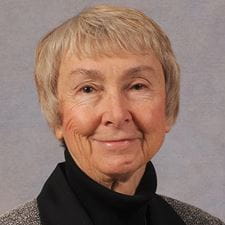 Dr. Saif is a Distinguished University Professor at The Ohio State University in the Food Animal Health Research Program, part of the Ohio Agricultural Research and Development Center in the College of Food, Agricultural, and Environmental Sciences, and the Veterinary Preventive Medicine Department in the College of Veterinary Medicine. She is a virologist and immunologist whose research focuses on comparative aspects of enteric and respiratory viral infections (coronaviruses, rotaviruses and caliciviruses) of food animals and humans.
Dr. Saif is a Distinguished University Professor at The Ohio State University in the Food Animal Health Research Program, part of the Ohio Agricultural Research and Development Center in the College of Food, Agricultural, and Environmental Sciences, and the Veterinary Preventive Medicine Department in the College of Veterinary Medicine. She is a virologist and immunologist whose research focuses on comparative aspects of enteric and respiratory viral infections (coronaviruses, rotaviruses and caliciviruses) of food animals and humans.
Her lab studies mucosal immunity and vaccine development and has focused on the impact of malnutrition and micronutrient deficiencies on vaccines and interactions of probiotics and the gut microbiota with the neonatal immune system, vaccines and viral pathogenesis. Her team’s discovery of the gut-mammary secretory IgA axis (initial description of a common mucosal immune system) in swine was a breakthrough for development of maternal coronavirus vaccines to passively protect neonatal animals. Her lab identified new enteric viruses (group C rotavirus, caliciviruses), characterized their pathogenesis and developed novel cultivation methods, diagnostic assays and vaccines for them. Her research emphasizes attenuated and novel bioengineered virus-like particle vaccines and adjuvants (vitamin A, probiotics) to prevent viral diarrheas in humans and animals and their evaluation in germfree animal disease models. Her lab also investigates the interrelationships among animal viruses, especially coronaviruses, and their human counterparts to assess their zoonotic potential, mechanisms of interspecies transmission and potential vaccines. She also conducts research on foodborne viruses, including noroviruses and sapoviruses.
Component leaders
She has been a part of the Center for Biostatistics since 2003, serving as Associate Director from 2009 to 2012. Dr. Fernández has been a part of the Ohio State community since 2001, serving as a visiting assistant professor within the Department of Statistics, where she taught undergraduate and graduate courses in the area of mathematical statistics and regression analysis for the engineering sciences. Prior to joining the university community, Dr. Fernández received a Master in Statistics in 1998 and a joint PhD in Statistics & Animal Breeding and Genetics in 2001 from Iowa State University.
Dr. Gumina earned his medical degree and PhD from the Medical College of Wisconsin and completed his predoctoral and postdoctoral fellowship in cardiovascular research at the Medical College of Wisconsin in Milwaukee. He subsequently completed his residency in internal medicine, as well as fellowships in cardiovascular diseases and interventional cardiology, and a clinical-investigator fellowship at Mayo Medical School in Rochester, Minnesota. Dr. Gumina is a member of the Medical School Admissions Committee at The Ohio State University College of Medicine, where he also serves as advisor to a number of undergraduate, medical and graduate students, as well as postdoctoral fellows. Dr. Gumina’s research is funded by the American Heart Association and the National Institutes of Health. Dr. Gumina’s specialty interests include interventional cardiology, acute coronary syndromes and cardiovascular inflammation.
During the COVID-19 pandemic, his research group has focused on the discovery of new SARS-CoV-2 strains and characterization of novel spike mutations, genomic predictors of cardiovascular disease in symptomatic patients, and host-virus transcriptomics. Recently, his group identified several emerging U.S.-based SARS-CoV-2 strains that share some features with worldwide strains of concern (BioRxiv, https://www.biorxiv.org/content/10.1101/2021.01.12.426407v3 and The Scientist, https://www.the-scientist.com/news-opinion/a-guide-to-emerging-sars-cov-2-variants-68387).
For the STOP-COVID project, his group is performing sequencing analysis of SARS-CoV-2, other respiratory viruses and immune system genes in nasopharyngeal samples. The goal is to better understand the association of viral strain differences with presenting symptoms and antibody response, and the elements of effective vaccine-induced and natural immunity at mucosal sites. He also serves as co-chair of the SERONET’s Molecular and Cellular Assays Operations group.
Dr. Lozanski is a Professor in the Clinical Pathology Branch in the Department of Pathology at The Ohio State University. He is also the Director of the Clinical Flow Cytometry Laboratory at The Ohio State University Wexner Medical Center.
Dr. Lozanski earned his MD from the Karol Marcinkowski Medical Academy in Poznan, Poland. He completed a residency in Anatomic and Clinical Pathology at the Akron City Hospital in Akron, Ohio, followed by a fellowship in Hematopathology at the Cleveland Clinic Foundation. Dr. Lozanski is board certified in Anatomic and Clinical Pathology and Hematopathology.
Dr. Liu is a Professor of Virology in the Department of Veterinary Biosciences, Microbial Infection and Immunity, as well as Microbiology, and Co-Director of the Viruses and Emerging Pathogens Program of the Infectious Diseases Institute at The Ohio State University. He studies virus-host interactions, in particular how RNA viruses enter host cells and cause pathogenesis in humans and animals. While in the past the Liu lab has mainly focused on retroviruses, including HIV, current efforts include some new human emerging and re-emerging infectious diseases, such as Ebola, Zika and COVID-19, particularly regarding host factors that modulate virus entry and release. One major effort is to understand the role of some classical interferon-stimulated genes (ISGs), including IFITM, viperin, and tetherin, as well as other atypical host restriction factors, such as TIM and SERINC proteins, in viral replication. Recently, Dr. Liu’s lab has developed a sensitive and specific high-throughput neutralization assay for SARS-CoV-2, which will be applied to determine the neutralizing antibody levels against the spike of this virus as well as their durations in Columbus first-responders and their household contacts of this U54 project.
Dr. Liu received his PhD from the University of Washington/Fred Hutchinson Cancer Research Center and his MD from Zhengzhou University College of Medicine. For more information, visit https://microbiology.osu.edu/people/liu.6244.
Team members
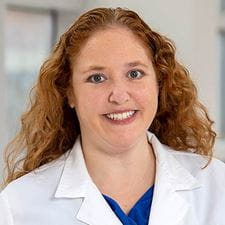 Dr. Frey is a Clinical Research Manager for the Department of Emergency Medicine at The Ohio State University. She has over 10 years of experience conducting clinical research in Emergency Medicine. Dr. Frey has worked with faculty, residents, staff, and students on numerous clinical research studies, serving as a mentor for individuals at all levels developing their research interests. She has also worked to write and manage federal, state, and foundation grants for both research and clinical implementation programs. Most recently, Dr. Frey’s work has included program management for the Center to STOP-COVID, coordination for a clinical trial comparing known treatments for severe infections (CLOVERS study), managing an observational study to understand the pharmacogenomics of opioid use, and implementing a clinical program to initiate medication-assisted therapy in the Emergency Department for patients experiencing withdrawal from opioids.
Dr. Frey is a Clinical Research Manager for the Department of Emergency Medicine at The Ohio State University. She has over 10 years of experience conducting clinical research in Emergency Medicine. Dr. Frey has worked with faculty, residents, staff, and students on numerous clinical research studies, serving as a mentor for individuals at all levels developing their research interests. She has also worked to write and manage federal, state, and foundation grants for both research and clinical implementation programs. Most recently, Dr. Frey’s work has included program management for the Center to STOP-COVID, coordination for a clinical trial comparing known treatments for severe infections (CLOVERS study), managing an observational study to understand the pharmacogenomics of opioid use, and implementing a clinical program to initiate medication-assisted therapy in the Emergency Department for patients experiencing withdrawal from opioids.
Dr. Frey has contributed to over 30 peer-reviewed publications that cover a variety of emergency medicine topics including geriatrics, emergency medical services (EMS), education, and diagnostics. She has participated as a coordinator or investigator in more than two dozen clinical trials funded by the NIH, CDC, and private industry. Dr. Frey also has served on grant review committees for multiple national professional organizations and is the chair of the department awards nominating committee, which seeks to promote and recognize the outstanding achievements and efforts by faculty, residents, students, and staff at local, regional, and national levels. She holds a Bachelor of Science degree in molecular genetics from Ohio State and a PhD in experimental therapeutics from The University of Texas Health Science Center and M.D. Anderson Cancer Center.
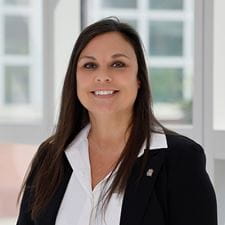 Alice Gaughan is the Associate Director of CATALYST at The Ohio State University. She drives health services and implementation sciences research administration, research strategy development, and operations at CATALYST. With more than 20 years of experience performing research at Ohio State, she has extensive experience building strong relationships leading to successful collaborations between health care and research teams. She is passionate about performing research that results in impactful change for the benefit of providers and patients. For the Center to STOP-COVID, she serves on the Leadership Team, collaborating with the project teams to plan, design and execute the studies as well as serve as the point of contact for community partners and Advisory Boards supporting the Center.
Alice Gaughan is the Associate Director of CATALYST at The Ohio State University. She drives health services and implementation sciences research administration, research strategy development, and operations at CATALYST. With more than 20 years of experience performing research at Ohio State, she has extensive experience building strong relationships leading to successful collaborations between health care and research teams. She is passionate about performing research that results in impactful change for the benefit of providers and patients. For the Center to STOP-COVID, she serves on the Leadership Team, collaborating with the project teams to plan, design and execute the studies as well as serve as the point of contact for community partners and Advisory Boards supporting the Center.
Alice received a Bachelor of Science degree in biology from Bethany College, a Master of Science degree in medical microbiology and immunology from Ohio State, and a Professional Certificate in Management from the Mendoza College of Business at the University of Notre Dame.
